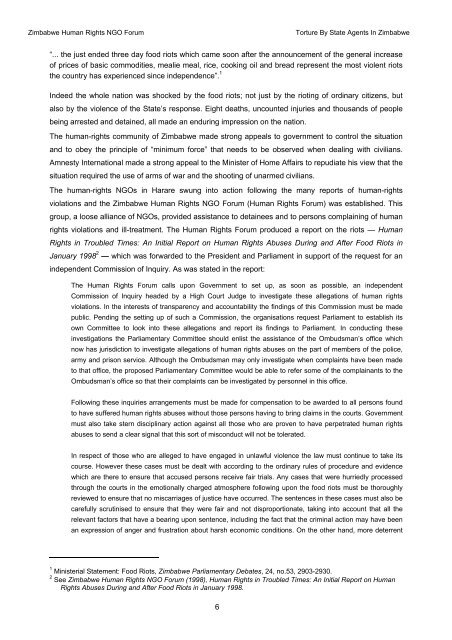Create successful ePaper yourself
Turn your PDF publications into a flip-book with our unique Google optimized e-Paper software.
Zimbabwe Human Rights NGO Forum<br />
Torture By State Agents In Zimbabwe<br />
“... the just ended three day food riots which came soon after the announcement of the general increase<br />
of prices of basic commodities, mealie meal, rice, cooking oil and bread represent the most violent riots<br />
the country has experienced since independence”. 1<br />
Indeed the whole nation was shocked by the food riots; not just by the rioting of ordinary citizens, but<br />
also by the violence of the State’s response. Eight deaths, uncounted injuries and thousands of people<br />
being arrested and detained, all made an enduring impression on the nation.<br />
The human-rights community of Zimbabwe made strong appeals to government to control the situation<br />
and to obey the principle of “minimum force” that needs to be observed when dealing with civilians.<br />
Amnesty International made a strong appeal to the Minister of Home Affairs to repudiate his view that the<br />
situation required the use of arms of war and the shooting of unarmed civilians.<br />
The human-rights NGOs in Harare swung into action following the many reports of human-rights<br />
violations and the Zimbabwe Human Rights NGO Forum (Human Rights Forum) was established. This<br />
group, a loose alliance of NGOs, provided assistance to detainees and to persons complaining of human<br />
rights violations and ill-treatment. The Human Rights Forum produced a report on the riots — Human<br />
Rights in Troubled Times: An Initial Report on Human Rights Abuses During and After Food Riots in<br />
January 1998 2 — which was forwarded to the President and Parliament in support of the request for an<br />
independent Commission of Inquiry. As was stated in the report:<br />
The Human Rights Forum calls upon Government to set up, as soon as possible, an independent<br />
Commission of Inquiry headed by a High Court Judge to investigate these allegations of human rights<br />
violations. In the interests of transparency and accountability the findings of this Commission must be made<br />
public. Pending the setting up of such a Commission, the organisations request Parliament to establish its<br />
own Committee to look into these allegations and report its findings to Parliament. In conducting these<br />
investigations the Parliamentary Committee should enlist the assistance of the Ombudsman’s office which<br />
now has jurisdiction to investigate allegations of human rights abuses on the part of members of the police,<br />
army and prison service. Although the Ombudsman may only investigate when complaints have been made<br />
to that office, the proposed Parliamentary Committee would be able to refer some of the complainants to the<br />
Ombudsman’s office so that their complaints can be investigated by personnel in this office.<br />
Following these inquiries arrangements must be made for compensation to be awarded to all persons found<br />
to have suffered human rights abuses without those persons having to bring claims in the courts. Government<br />
must also take stern disciplinary action against all those who are proven to have perpetrated human rights<br />
abuses to send a clear signal that this sort of misconduct will not be tolerated.<br />
In respect of those who are alleged to have engaged in unlawful violence the law must continue to take its<br />
course. However these cases must be dealt with according to the ordinary rules of procedure and evidence<br />
which are there to ensure that accused persons receive fair trials. Any cases that were hurriedly processed<br />
through the courts in the emotionally charged atmosphere following upon the food riots must be thoroughly<br />
reviewed to ensure that no miscarriages of justice have occurred. The sentences in these cases must also be<br />
carefully scrutinised to ensure that they were fair and not disproportionate, taking into account that all the<br />
relevant factors that have a bearing upon sentence, including the fact that the criminal action may have been<br />
an expression of anger and frustration about harsh economic conditions. On the other hand, more deterrent<br />
1 Ministerial Statement: Food Riots, Zimbabwe Parliamentary Debates, 24, no.53, 2903-2930.<br />
2 See Zimbabwe Human Rights NGO Forum (1998), Human Rights in Troubled Times: An Initial Report on Human<br />
Rights Abuses During and After Food Riots in January 1998.<br />
6
















